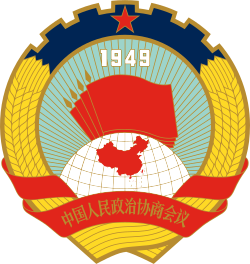Provisions
The Common Program defined China as a "new democracy" which would practice a people's democratic dictatorship led by the proletariat and based on an alliance of workers and peasants which would unite all of China's "democratic classes" (defined as those opposing imperialism, feudalism, and bureaucratic capitalism and favoring an independent China). [1] : 25
The Common Program described people's congresses as the primary organs through which the people would exercise state power. [1] : 26 It stated that the National People's Congress was the highest body of state power. [1] : 26 According to the Common Program, all state organs should practice democratic centralism. [1] : 26
The Common Program described the primary task of the new government as eliminating feudal, compradorial, and fascist ideologies. [3] : 27
Generally, the Common Program prioritized ownership of the state-owned economy, although it also gave consideration to some private interests. [1] : 4 It did not seek to eliminate capitalism as a whole, instead encouraging private enterprises viewed as beneficial to the national economy and sought to implement a mixed economy. [1] : 4–5
In Article 26, the Common Program defines "development of production" as the primary goal intended to be achieved through the establishment of socialist relations of production. [4] : 63 It states, "The basic principle for the economic construction of the People's Republic of China is ... to achieve the goal of developing production and a flourishing economy ... to promote the development of the entire society and economy." [4] : 63
The Common Program addresses agriculture in Article 34, stating that "the People's Government should organize peasants and all labor power that can carry out agricultural work to ... [develop] agricultural production ... Every step of land reform should be integrated with the revival and development of agricultural production." [4] : 80
Article 35 emphasized the development of heavy industry, such as mining, iron and steel, power, machinery, electrical industry, and the chemical industry "in order to build a foundation for the industrialization of the nation." [4] : 81
Regarding China's foreign policy, Articles 54 and 56 state that China's foreign relations would be based on respect for mutual sovereignty. [5] : 469
This page is based on this
Wikipedia article Text is available under the
CC BY-SA 4.0 license; additional terms may apply.
Images, videos and audio are available under their respective licenses.


